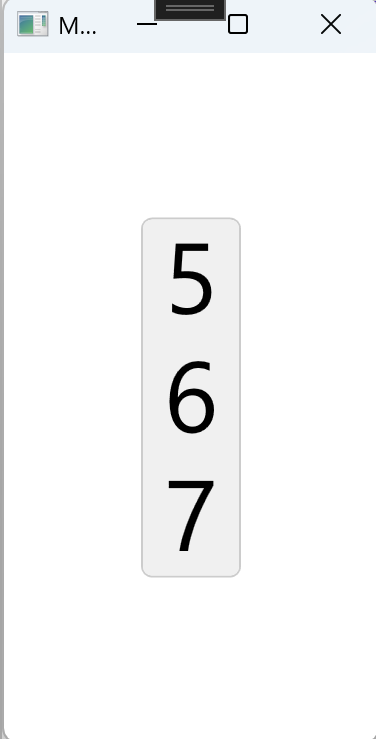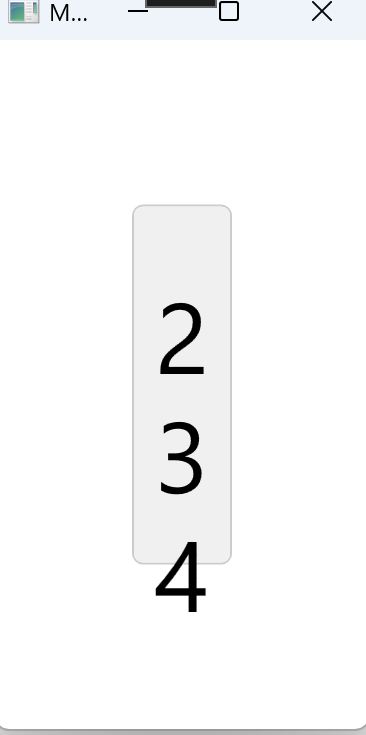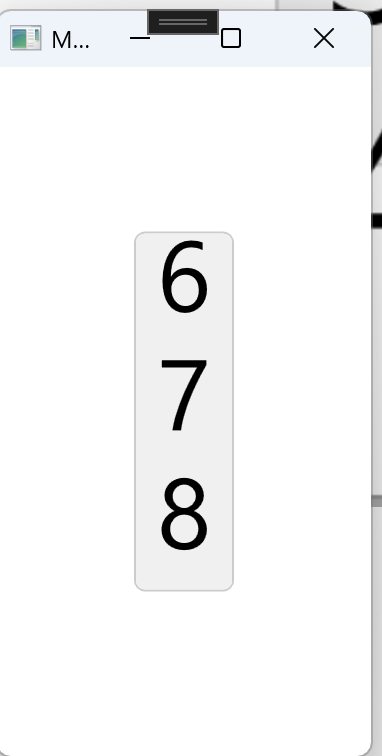//uc.xaml
<UserControl x:Class="WpfApp201.UCScrollNum"
xmlns="http://schemas.microsoft.com/winfx/2006/xaml/presentation"
xmlns:x="http://schemas.microsoft.com/winfx/2006/xaml"
xmlns:mc="http://schemas.openxmlformats.org/markup-compatibility/2006"
xmlns:d="http://schemas.microsoft.com/expression/blend/2008"
xmlns:local="clr-namespace:WpfApp201"
mc:Ignorable="d"
d:DesignHeight="180" d:DesignWidth="150">
<Grid>
<Grid>
<Grid.RowDefinitions>
<RowDefinition Height="180"/>
</Grid.RowDefinitions>
<Grid.ColumnDefinitions>
<ColumnDefinition/>
<ColumnDefinition Width="50"/>
<ColumnDefinition/>
</Grid.ColumnDefinitions>
<Border Background="#F0F0F0"
CornerRadius="5"
BorderThickness="1"
BorderBrush="#CCCCCC"
Grid.Row="0"
Grid.Column="1">
<Grid>
<Grid.RowDefinitions>
<RowDefinition/>
<RowDefinition/>
<RowDefinition/>
</Grid.RowDefinitions>
<TextBlock x:Name="numTbk1"
Text="0"
FontSize="50"
Grid.Row="0"
Grid.Column="0"
HorizontalAlignment="Center"
Visibility="{Binding UpTbkVisibility,Mode=TwoWay,UpdateSourceTrigger=PropertyChanged}" />
<TextBlock x:Name="numTbk2"
Text="0"
FontSize="50"
Grid.Row="1"
Grid.Column="0"
HorizontalAlignment="Center"
Visibility="{Binding MiddleTbkVisibility,Mode=TwoWay,UpdateSourceTrigger=PropertyChanged}"/>
<TextBlock x:Name="numTbk3"
Text="0"
FontSize="50"
Grid.Row="2"
Grid.Column="0"
HorizontalAlignment="Center"
Visibility="{Binding DownTbkVisibility,Mode=TwoWay,UpdateSourceTrigger=PropertyChanged}"/>
</Grid>
</Border>
</Grid>
</Grid>
</UserControl>
//uc.xaml.cs
using System;
using System.Collections.Generic;
using System.ComponentModel;
using System.Linq;
using System.Runtime.CompilerServices;
using System.Text;
using System.Threading.Tasks;
using System.Windows;
using System.Windows.Controls;
using System.Windows.Data;
using System.Windows.Documents;
using System.Windows.Input;
using System.Windows.Media;
using System.Windows.Media.Animation;
using System.Windows.Media.Imaging;
using System.Windows.Navigation;
using System.Windows.Shapes;
namespace WpfApp201
{
/// <summary>
/// Interaction logic for UCScrollNum.xaml
/// </summary>
public partial class UCScrollNum : UserControl, INotifyPropertyChanged
{
public UCScrollNum()
{
InitializeComponent();
this.DataContext = this;
}
public bool UCIsIncremented
{
get { return (bool)GetValue(UCIsIncrementedProperty); }
set { SetValue(UCIsIncrementedProperty, value); }
}
// Using a DependencyProperty as the backing store for UCIsIncremented. This enables animation, styling, binding, etc...
public static readonly DependencyProperty UCIsIncrementedProperty =
DependencyProperty.Register("UCIsIncremented", typeof(bool),
typeof(UCScrollNum), new PropertyMetadata(true, OnUCIsIncrementedChanged));
private static void OnUCIsIncrementedChanged(DependencyObject d, DependencyPropertyChangedEventArgs e)
{
}
public Visibility UpTbkVisibility
{
get { return (Visibility)GetValue(UpTbkVisibilityProperty); }
set { SetValue(UpTbkVisibilityProperty, value); }
}
// Using a DependencyProperty as the backing store for UpTbkVisibility. This enables animation, styling, binding, etc...
public static readonly DependencyProperty UpTbkVisibilityProperty =
DependencyProperty.Register("UpTbkVisibility", typeof(Visibility),
typeof(UCScrollNum), new PropertyMetadata(Visibility.Visible));
public Visibility MiddleTbkVisibility
{
get { return (Visibility)GetValue(MiddleTbkVisibilityProperty); }
set { SetValue(MiddleTbkVisibilityProperty, value); }
}
// Using a DependencyProperty as the backing store for MiddleTbkVisibility. This enables animation, styling, binding, etc...
public static readonly DependencyProperty MiddleTbkVisibilityProperty =
DependencyProperty.Register("MiddleTbkVisibility", typeof(Visibility),
typeof(UCScrollNum), new PropertyMetadata(Visibility.Visible));
public Visibility DownTbkVisibility
{
get { return (Visibility)GetValue(DownTbkVisibilityProperty); }
set { SetValue(DownTbkVisibilityProperty, value); }
}
// Using a DependencyProperty as the backing store for DownTbkVisibility. This enables animation, styling, binding, etc...
public static readonly DependencyProperty DownTbkVisibilityProperty =
DependencyProperty.Register("DownTbkVisibility", typeof(Visibility),
typeof(UCScrollNum), new PropertyMetadata(Visibility.Visible));
public double UCScrollDuration
{
get { return (double)GetValue(UCScrollDurationProperty); }
set { SetValue(UCScrollDurationProperty, value); }
}
// Using a DependencyProperty as the backing store for UCScrollDuration. This enables animation, styling, binding, etc...
public static readonly DependencyProperty UCScrollDurationProperty =
DependencyProperty.Register("UCScrollDuration", typeof(double),
typeof(UCScrollNum), new PropertyMetadata(1000.0d));
public int UCValue
{
get { return (int)GetValue(UCValueProperty); }
set { SetValue(UCValueProperty, value); }
}
// Using a DependencyProperty as the backing store for UCValue. This enables animation, styling, binding, etc...
public static readonly DependencyProperty UCValueProperty =
DependencyProperty.Register("UCValue", typeof(int),
typeof(UCScrollNum), new PropertyMetadata(0, OnUCValueChanged));
private static void OnUCValueChanged(DependencyObject d, DependencyPropertyChangedEventArgs e)
{
var ucScrollNum = d as UCScrollNum;
int newValue = 0;
if (ucScrollNum != null && Int32.TryParse(e.NewValue?.ToString(), out newValue))
{
ucScrollNum.NumValue = newValue;
}
}
public event PropertyChangedEventHandler PropertyChanged;
private void OnPropertyChanged([CallerMemberName] string propName = "")
{
var handler = PropertyChanged;
if (handler != null)
{
handler?.Invoke(this, new PropertyChangedEventArgs(propName));
}
}
private int numValue = 0;
public int NumValue
{
get
{
return numValue;
}
set
{
if (numValue != value)
{
numValue = value;
OnPropertyChanged(nameof(NumValue));
OnUCValueChanged();
}
}
}
private void OnUCValueChanged()
{
int value = NumValue;
int oldValue = value;
if (++value > 9)
{
value = 0;
}
int nextValue = value + 1;
if (nextValue > 9)
{
nextValue = 0;
}
AnimateChange(oldValue, value, nextValue, 30, -30, UCScrollDuration);
}
private void AnimateChange(int oldValue, int nowValue, int nextValue, int fromValue = 0, int toValue = 0, double durationValue = 1000)
{
Application.Current?.Dispatcher.BeginInvoke(new Action(() =>
{
numTbk1.Text = oldValue.ToString();
numTbk2.Text = nowValue.ToString();
numTbk3.Text = nextValue.ToString();
var animation = new DoubleAnimation
{
From = fromValue,
To = toValue,
Duration = TimeSpan.FromMilliseconds(durationValue)
};
// Apply animation
var transform = new TranslateTransform();
numTbk1.RenderTransform = transform;
numTbk2.RenderTransform = transform;
numTbk3.RenderTransform = transform;
transform.BeginAnimation(TranslateTransform.YProperty, animation);
}));
}
}
}
//window.xaml
<Window x:Class="WpfApp201.MainWindow"
xmlns="http://schemas.microsoft.com/winfx/2006/xaml/presentation"
xmlns:x="http://schemas.microsoft.com/winfx/2006/xaml"
xmlns:d="http://schemas.microsoft.com/expression/blend/2008"
xmlns:mc="http://schemas.openxmlformats.org/markup-compatibility/2006"
xmlns:local="clr-namespace:WpfApp201"
mc:Ignorable="d"
xmlns:behavior="http://schemas.microsoft.com/xaml/behaviors"
Title="MainWindow" Height="380" Width="200">
<Grid>
<Grid.RowDefinitions>
<RowDefinition/>
<RowDefinition Height="Auto"/>
<RowDefinition/>
</Grid.RowDefinitions>
<local:UCScrollNum
Grid.Row="1"
HorizontalAlignment="Center"
UCValue="{Binding DataContext.NumValue,Mode=TwoWay,UpdateSourceTrigger=PropertyChanged,
RelativeSource={RelativeSource Mode=FindAncestor,AncestorType={x:Type Window}}}"/>
</Grid>
</Window>
//window.xaml.cs
using System;
using System.Collections.Generic;
using System.ComponentModel;
using System.Linq;
using System.Text;
using System.Threading.Tasks;
using System.Windows;
using System.Windows.Controls;
using System.Windows.Data;
using System.Windows.Documents;
using System.Windows.Input;
using System.Windows.Media;
using System.Windows.Media.Imaging;
using System.Windows.Navigation;
using System.Windows.Shapes;
namespace WpfApp201
{
/// <summary>
/// Interaction logic for MainWindow.xaml
/// </summary>
public partial class MainWindow : Window
{
public MainWindow()
{
InitializeComponent();
var vm = new MainVM();
this.DataContext = vm;
}
}
public class MainVM : INotifyPropertyChanged
{
private System.Timers.Timer tmr;
public MainVM()
{
InitTmr();
}
private void InitTmr()
{
if(tmr==null)
{
tmr= new System.Timers.Timer();
tmr.Interval = 1000;
tmr.Elapsed += Tmr_Elapsed;
tmr.Start();
}
}
private void Tmr_Elapsed(object sender, System.Timers.ElapsedEventArgs e)
{
//++Num;
++NumValue;
}
private ICommand mouseDownCommand;
public ICommand MouseDownCommand
{
get
{
if(mouseDownCommand == null)
{
mouseDownCommand = new DelCommand(MouseDownCommandExecuted, MouseDownCommandCanExecute);
}
return mouseDownCommand;
}
}
private bool MouseDownCommandCanExecute(object obj)
{
return true;
}
private void MouseDownCommandExecuted(object obj)
{
IsValueIncremented = !IsValueIncremented;
}
public event PropertyChangedEventHandler PropertyChanged;
private void OnPropertyChanged(string propertyName)
{
var handler = PropertyChanged;
if (handler != null)
{
handler?.Invoke(this, new PropertyChangedEventArgs(propertyName));
}
}
private int numValue;
public int NumValue
{
get
{
return numValue;
}
set
{
if(value!=numValue)
{
if(value>9)
{
value = 0;
}
if(value<0)
{
value = 9;
}
numValue = value;
OnPropertyChanged(nameof(NumValue));
}
}
}
private int num=60;
public int Num
{
get
{
return num;
}
set
{
if(value!=num)
{
num = value;
OnPropertyChanged(nameof(Num));
OnNumChanged();
}
}
}
private void OnNumChanged()
{
var tempNum = Num;
HundredsNum = tempNum / 100;
TensNum = tempNum % 100 / 10;
UIntsNum= tempNum % 10;
Console.WriteLine($"Num:{Num},HundredsNum:{HundredsNum},TensNum:{TensNum},UIntsNum:{UIntsNum}");
}
private int hundredsNum;
public int HundredsNum
{
get
{
return hundredsNum;
}
set
{
if (value != hundredsNum)
{
hundredsNum = value;
OnPropertyChanged(nameof(HundredsNum));
}
}
}
private int tensNum;
public int TensNum
{
get
{
return tensNum;
}
set
{
if (value != tensNum)
{
tensNum = value;
OnPropertyChanged(nameof(TensNum));
}
}
}
private int uIntsNum;
public int UIntsNum
{
get
{
return uIntsNum;
}
set
{
if (value != uIntsNum)
{
uIntsNum = value;
OnPropertyChanged(nameof(UIntsNum));
}
}
}
private bool isValueIncremented = false;
public bool IsValueIncremented
{
get
{
return isValueIncremented;
}
set
{
if (value != isValueIncremented)
{
isValueIncremented = value;
OnPropertyChanged(nameof(IsValueIncremented));
}
}
}
public class DelCommand : ICommand
{
private Action<object> execute;
private Predicate<object> canExecute;
public DelCommand(Action<object> executeValue, Predicate<object> canExecuteValue)
{
execute = executeValue;
canExecute = canExecuteValue;
}
public event EventHandler CanExecuteChanged
{
add
{
CommandManager.RequerySuggested += value;
}
remove
{
CommandManager.RequerySuggested -= value;
}
}
public bool CanExecute(object parameter)
{
if (canExecute == null)
{
return true;
}
return canExecute(parameter);
}
public void Execute(object parameter)
{
execute(parameter);
}
}
}
}







 浙公网安备 33010602011771号
浙公网安备 33010602011771号